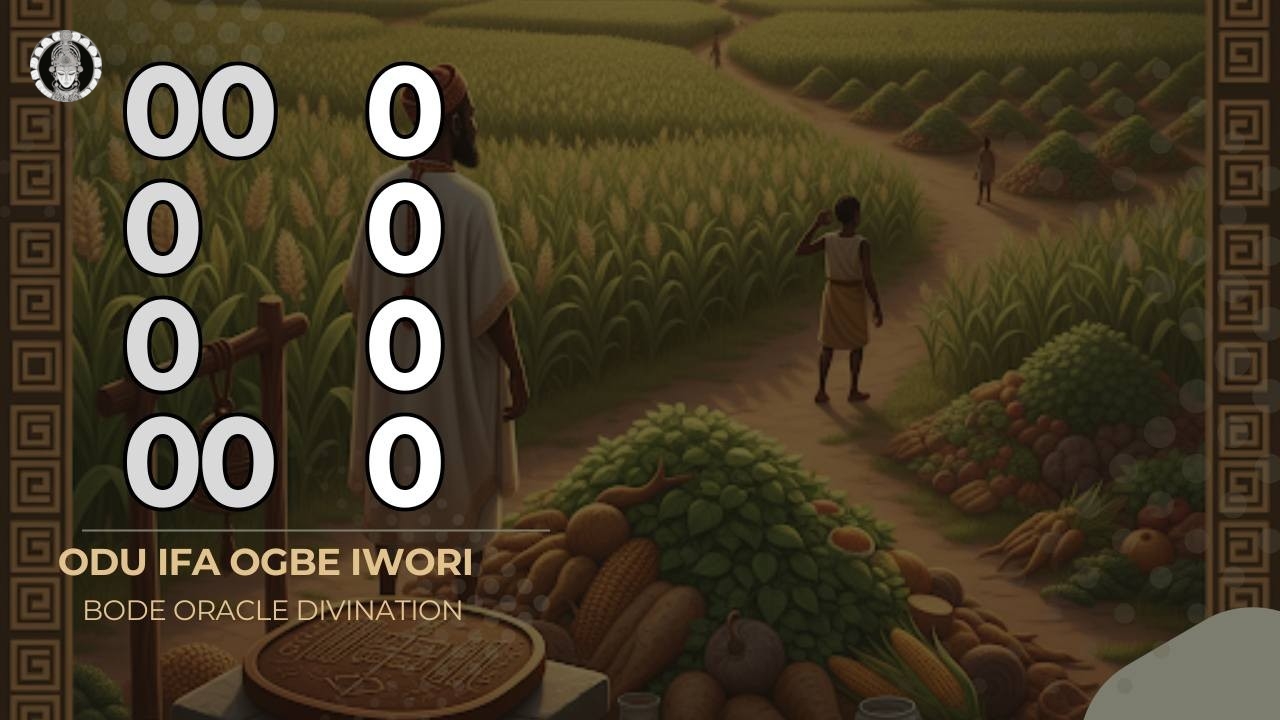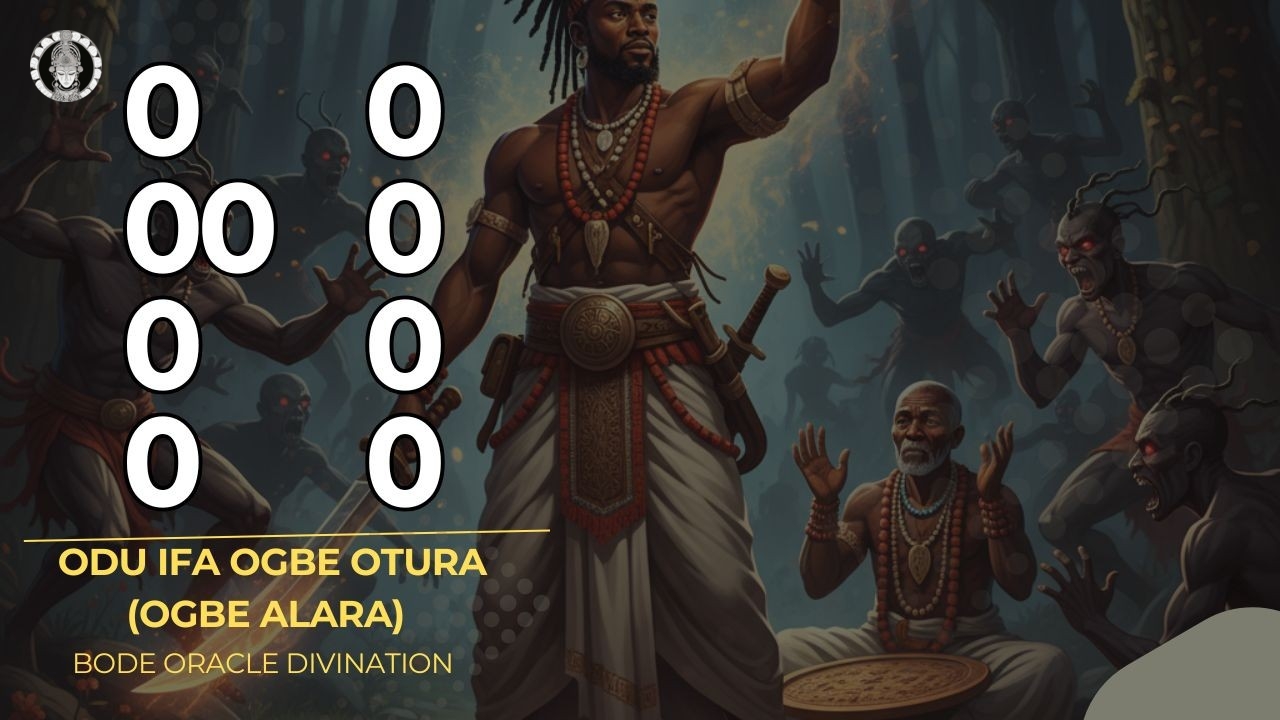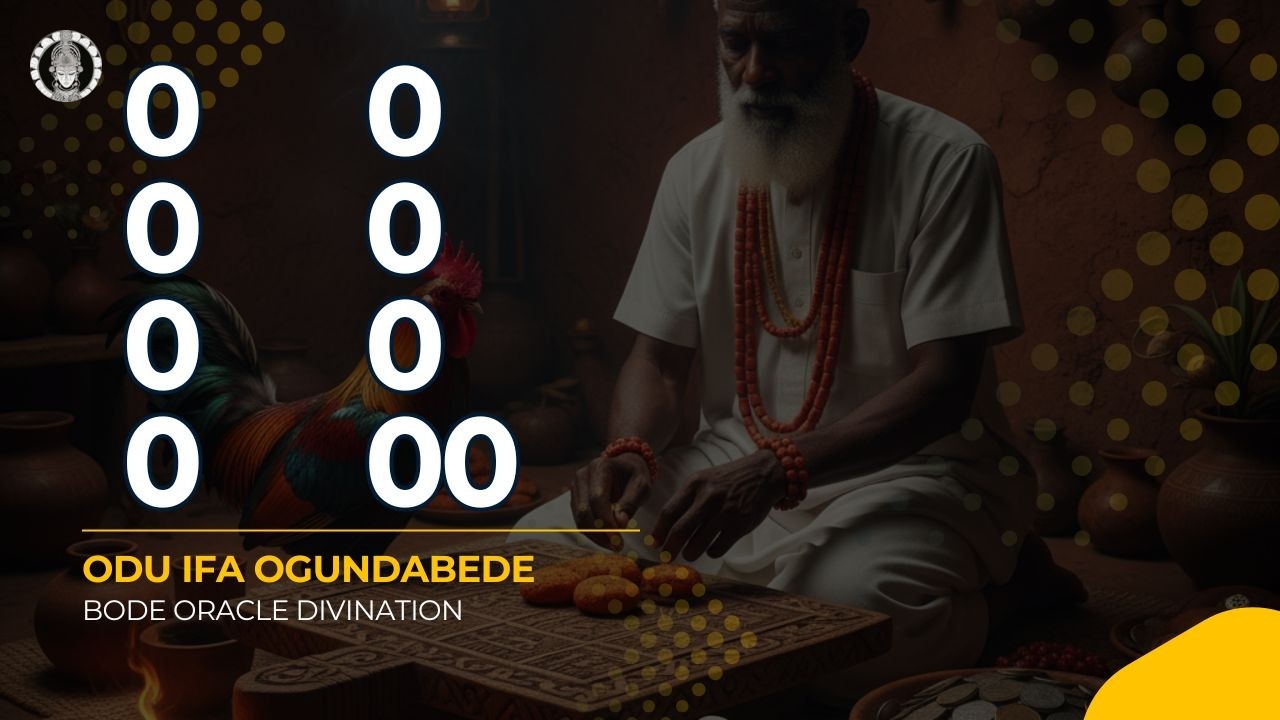Introduction to Odu Ifa Ogunda Ogbe (Ogundabede)
Odu Ifa Ogunda Ogbe, also known as Ogundabede or Ogundaborogbe, represents one of the 256 sacred divination signs in the Ifa corpus. This powerful Odu carries profound messages about attracting wealth and honor, protecting one's possessions from thieves, inviting all forms of blessings into the home, and achieving complete victory over enemies. Through the wisdom of Ogunda Ogbe, we learn how proper sacrifices combined with spiritual discipline can transform scarcity into abundance and vulnerability into protection.
The divinations within Ogunda Ogbe address fundamental human concerns: the desire for prosperity and recognition, the need to safeguard what we have worked for, the longing for comprehensive blessings in all areas of life, and the requirement for spiritual strength to overcome opposition. Each story serves as both practical instruction and spiritual revelation, teaching us how to align ourselves with forces of abundance and protection. For comprehensive understanding of the 16 Odu Ifa and their meanings, explore our detailed guide.
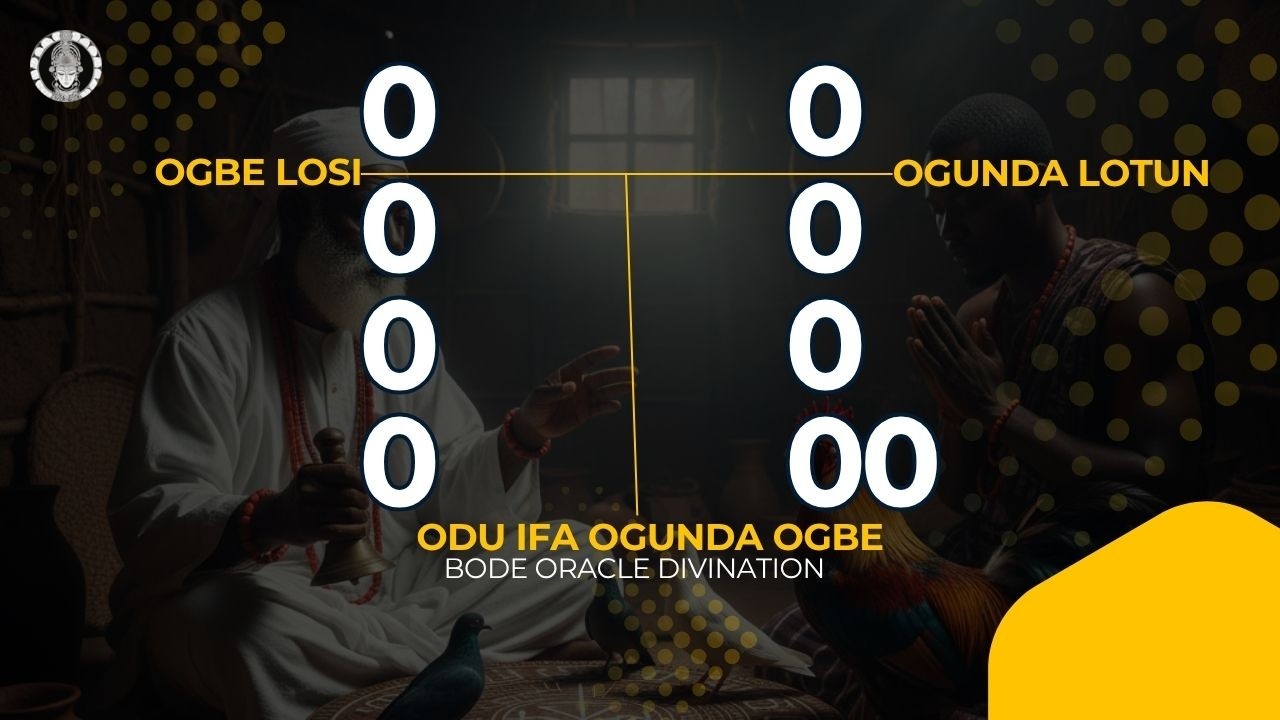
Ifa Divination for Tela Roko Tiya: The Mystery of Wealth and Honor
Understanding the Blessing of Abundant Wealth
This divination from Ogunda Ogbe addresses one of humanity's most desired blessings—wealth (ola) combined with honor and spiritual blessings (ibukun). Ifa reveals that the person receiving this Odu is destined for extraordinary prosperity, but this blessing comes with a crucial requirement: discretion about the source of one's wealth. The divination teaches that sometimes the path to maintaining blessings lies in strategic silence rather than full disclosure.
What makes this divination particularly profound is Ifa's warning that people will inquire about the source of the person's wealth. Rather than revealing the spiritual foundations of their prosperity, they are instructed to remain silent. This principle recognizes that not everyone has the spiritual maturity to understand or appreciate the role of Ifa in material success, and that explaining such matters to skeptics or the spiritually unprepared can actually diminish the blessings.
The Taboo Against Kola Nut
One of the most significant aspects of this divination is the permanent prohibition against consuming kola nut (orogbo). In Yoruba culture, kola nut holds deep spiritual significance and is commonly used in greetings, ceremonies, and offerings. However, for those who receive this particular Odu, consuming kola nut would spiritually counteract the blessings they have received. This demonstrates how Ifa prescriptions can include both positive actions (what to do) and restrictions (what to avoid) to maintain spiritual alignment.
The irony is striking: while kola nut must be offered as part of the sacrifice (ebo), the person making the offering must never consume it themselves. This teaches an important spiritual principle—sometimes we must give away the very things we desire, or abstain from things we offer to others, in order to receive greater blessings.
The Sacred Verse
Leke leke ni oye dudu
Agbigbo ni oye tie ni funfun
Eye nla abi fora agajigi legan
Adifafun Tela Roko Tiya
to kola wale bi oba ereke
Ebo won ni o se
O si gbebo nibe o rubo
Nje, isetan temi gbayi
Telaroko mojiwo loko
English Translation
The black-winged stilt has a black crown,
The Agbigbo bird has a white crown,
The great bird that flies majestically through the forest.
Ifa divination was cast for Tela Roko Tiya,
Who brought kola nut home like a king of sugarcane.
He was advised to offer a sacrifice,
And he complied.
Now my work is complete,
Tela Roko has awakened in the farm.
Interpreting the Bird Symbolism
The verse opens with references to two birds with contrasting crowns—one black, one white. This duality represents the balance between visible and hidden aspects of prosperity. The black crown symbolizes the mysteries that should remain concealed (the spiritual source of wealth), while the white crown represents what is openly visible (the manifestation of that wealth). The "great bird that flies majestically" is the person who has mastered this balance, moving through life with both spiritual power and material success.
The comparison to "a king of sugarcane" is particularly meaningful. Sugarcane represents sweetness, prosperity, and something that multiplies itself when properly cultivated. A king of sugarcane is one whose wealth is both abundant and self-perpetuating—exactly what this divination promises when its prescriptions are followed.
Prescribed Offerings (Ebo)
For attracting abundant wealth and honor, Ifa prescribes pigeons (eyele), abundant kola nuts (opolopo orogbo), and money (opolopo owo). The pigeons represent peace and the gentle arrival of blessings. The kola nuts, while forbidden for personal consumption, serve as powerful attractors of wealth when offered to Ifa. The money in the offering acts as a spiritual seed that multiplies into greater financial abundance. Learn more about Ogunda Ogbe divination practices on our dedicated page.
Ifa Divination for Aduke: Spiritual Protection Against Theft and Loss
Understanding the Vulnerability to Theft
This divination from Ogunda Ogbe addresses a specific and troubling situation—the presence of spiritual openings in one's home or life that allow thieves and malevolent forces (ajogun) to enter and steal. Ifa reveals that where there are gaps, holes, or weak points (awon iho) in a person's dwelling or spiritual defenses, these become entry points for loss, theft, and negative forces. This applies not only to physical security but to spiritual vulnerabilities that manifest as repeated losses or unexplained disappearances of resources.
The divination identifies Aduke as someone who has been experiencing such losses—resources seeming to disappear, possessions going missing, or wealth slipping away inexplicably. The Yoruba expression "afi olele disa eku" (using thieves to block rats) suggests a situation where one problem has been used to address another, but the underlying vulnerability remains unaddressed.
The Spiritual Solution: Closing the Gaps
Ifa's prescription is both practical and spiritual. All holes, gaps, and weak points in the dwelling must be sealed—not just physically, but spiritually. This is accomplished through a combination of structural repair and spiritual fortification. The use of alupaida leaves (a plant known for its protective properties) and agbesi leaves combined with the prescribed offerings creates a spiritual barrier that prevents thieves—both physical and spiritual—from gaining access.
The symbolism is powerful: just as physical holes in walls allow intruders to enter, spiritual gaps in one's defenses allow negative forces to steal blessings, resources, and prosperity. The ritual sealing of these gaps with spiritually empowered herbs creates an invisible but impenetrable shield around the person's life and possessions.
The Sacred Verse
Bi Agun iyan sinu awo esun
Eni toyo lanan oluware ni o yoo
Bi a roka sinu epo epa eru toyo lanan oluware ni o yoo
Adifafun aduke omo afi olele disa eku
Ebo ni won ni o se
O si gbebo nibe orubo
Nje ki ni aduke fidisa
Olele
Oolele laduke fidisa eku
Ki ni o pari ibi da fawo
Apada oko ka sa pari ibi da
Ki ni onije ki ibi ose le nile awo
Egbe si oko momo je bi o se le nile awo
English Translation
When pounded yam is placed in a broken mortar,
The one who repairs it will be the beneficiary.
When kola is placed in groundnut oil, the one who repairs the container will benefit.
Ifa divination was cast for Aduke,
The child who used thieves to block rats.
She was advised to offer a sacrifice,
And she complied.
What did Aduke use to block?
Thieves.
Aduke used thieves to block rats.
What finished the evil at the farm?
Returning to the farm finished the evil.
What allows evil to cease in the priest's house?
Going to the farm regularly prevents evil from dwelling in the priest's house.
The Metaphor of the Broken Container
The verse uses powerful domestic metaphors to explain the principle. A broken mortar cannot hold pounded yam—it leaks out through the cracks. Similarly, a broken container cannot properly hold palm oil or groundnut oil. These images represent a life or home with spiritual vulnerabilities—blessings come in but leak out through the gaps, never accumulating into lasting prosperity. The solution is not just to bring in more blessings but to repair the container itself so that blessings can be retained.
Prescribed Offerings (Ebo)
For protection against theft and sealing spiritual vulnerabilities, Ifa prescribes pigeons (eyele), a rooster (akuko adie), and money (opolopo owo), combined with alupaida and agbesi leaves. These materials work together to create both spiritual closure and protective barriers. For deeper understanding of Yoruba spiritual practices, consult UNESCO documentation on Ifa of the Yoruba People.
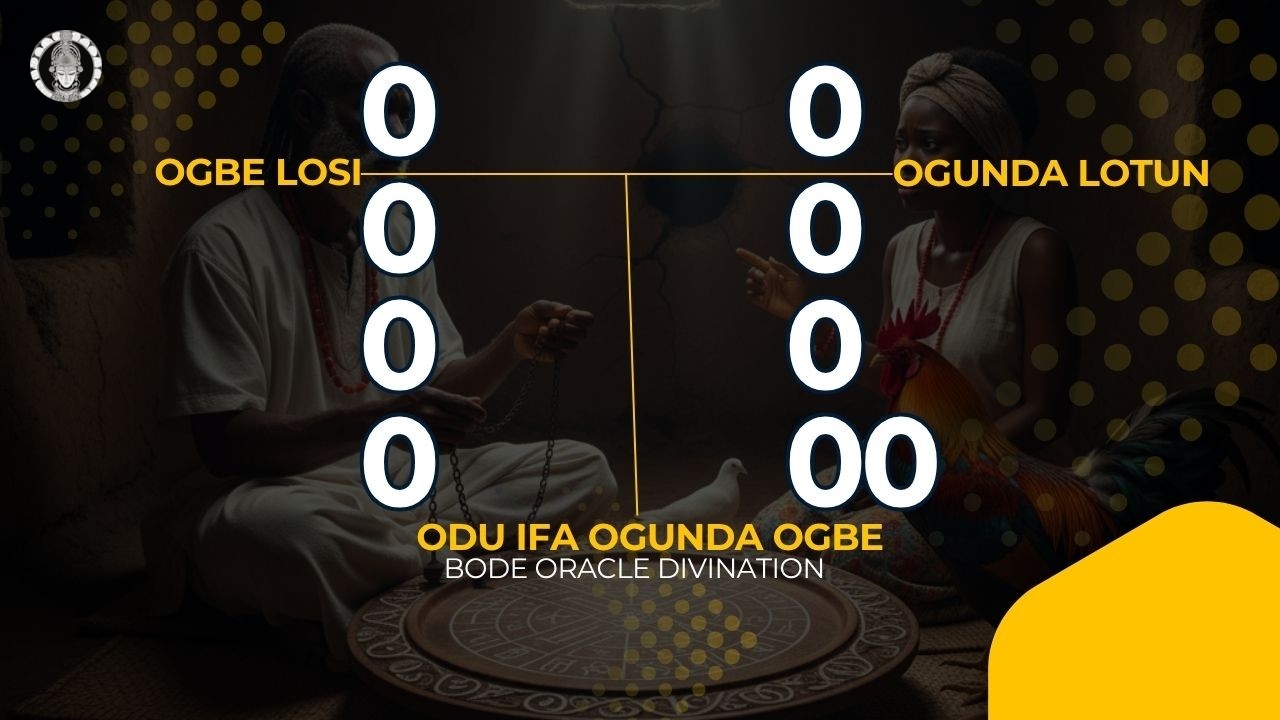
Ifa Divination for Ori: Attracting All Forms of Blessings to the Home
The Comprehensive Blessing of Total Prosperity
This divination from Ogunda Ogbe addresses the desire for complete and comprehensive blessings—not just wealth alone, but all forms of ire (blessings) including prosperity (aje), children (omo), spouse (aya), and general wellbeing. Ifa reveals that through proper sacrifice, all these blessings can be attracted to enter one's home and remain there permanently. This represents one of the most expansive promises in the Ifa corpus—the invitation of every category of blessing into one's life simultaneously.
The central figure is Ori (literally "head," representing one's personal destiny and spiritual consciousness). In this context, Ori went to consult Ifa before embarking on spiritual work at the house of a wealthy person (ajule oloro). The divination teaches that even Ori itself—the spiritual essence of human destiny—must perform ebo to ensure that blessings are properly activated and attracted.
The Role of Bean Cakes (Akara) in Blessing Attraction
One of the unique aspects of this divination is the prescription of bean cakes fried in palm oil (akara elepo) as part of the offering. In Yoruba culture, akara holds special spiritual significance—it is round like the sun, golden like wealth, and made from beans which multiply when planted. The frying in palm oil adds another layer: palm oil (epo pupa) represents life force, vitality, and the essence of prosperity in Yoruba spirituality.
The verse repeatedly uses the phrase "ko sai yawale oloro" (it cannot fail to enter the wealthy person's home), emphasizing the certainty and inevitability of blessings when this prescription is followed. This is not a hope or possibility but a guaranteed spiritual outcome.
The Sacred Verse
Omo ni dindindin awo ori
Lodifa fun ori
Ori sawo lo ajule oloro
Ebo won ni ko se
Ori gbebonibe orubo
Nje, aje ile mi ni eyawa
Omo nidindin akara dindin, Ko sai yawale oloro
aya ile mi ni eyawa
Omo nidindin akara dindin, ko sai yawale oloro
ire gbogbo ile mi ni eyawa
Omo ni dindin akara dindin, ko saiya wa le oloro
English Translation
The child is round and complete, the priest of Ori,
Cast Ifa for Ori,
When Ori was going to perform spiritual work at the wealthy person's home.
He was advised to offer a sacrifice,
And Ori complied with the offering.
Now, wealth of my home is coming,
The child is round, the bean cake is round, it cannot fail to enter the wealthy person's home.
Spouse for my home is coming,
The child is round, the bean cake is round, it cannot fail to enter the wealthy person's home.
All blessings for my home are coming,
The child is round, the bean cake is round, they cannot fail to enter the wealthy person's home.
The Symbolism of Roundness and Completion
The verse emphasizes "dindindin" (roundness, completeness, wholeness) repeatedly. This is deeply significant in Yoruba cosmology. Roundness represents perfection, completion, the cycle of life, and the absence of sharp edges or vulnerabilities. A round object has no weak points—it is equally strong in all directions. Similarly, when blessings are "round" or complete, they come in their fullness without lack or deficiency.
The comparison between the child (omo), the bean cake (akara), and blessings (ire) suggests that all three share the quality of roundness and completion. Children are the ultimate blessing, round like the bean cake, both symbolizing the fullness of life and prosperity. The repetitive structure of the chant creates a powerful spiritual momentum, affirming again and again that blessings cannot fail to enter when conditions are properly established.
Prescribed Offerings (Ebo)
For attracting all forms of blessings to one's home, Ifa prescribes bean cakes fried in palm oil (akara elepo), pigeons (eyele), a rooster (akuko adire), and money (opolopo owo). These offerings must be presented to Ifa with the understanding that they are creating a spiritual magnet for comprehensive prosperity. Explore more wisdom from our collection of Ifa teachings.
Ifa Divination for Ogunda: Complete Victory Over Numerous Enemies
Confronting Multiple Adversaries
This divination from Ogunda Ogbe addresses a situation of being surrounded by many enemies (awon ota po). Unlike other divinations that deal with specific threats or individual opponents, this verse speaks to a condition where adversaries are numerous and potentially overwhelming. Ifa reveals that victory is possible even against multiple enemies, but only through proper spiritual preparation and the performance of prescribed sacrifices.
The central figure is Ogunda itself—the warrior Odu, the principle of strength, determination, and martial prowess in the Ifa system. Even Ogunda, despite being naturally strong and warrior-like, must perform ebo to achieve victory. This teaches a crucial lesson: spiritual strength alone is insufficient without proper spiritual alignment through sacrifice.
The Spiritual Dynamics of Victory
The divination reveals that Ogunda needed to "press down" or overcome (bori) Ogbe. This is significant because Ogbe is the first and most senior Odu, representing authority, primacy, and established power. The metaphor suggests that even when facing established authorities, entrenched opposition, or seemingly insurmountable odds, victory is achievable through proper spiritual work.
The phrase "ori rere ni tele ogunda" (good head/destiny follows Ogunda) is the key to understanding this divination. Victory doesn't come from fighting alone but from having good ori—proper destiny alignment and spiritual consciousness. When one's ori is properly aligned through ebo, victory naturally follows because the spiritual forces arrange circumstances in one's favor.
The Sacred Verse
Agongo sigo
Agongo sigo
Adifafun ogunda
Ti yoo teyin wa borogbo mole
Ebo ni won ni kose
O si gbebo nibe orubo
Nje, ori rere ni tele ogunda lo leyin wa bori ogbe Mole
ori rere mitere
English Translation
Agongo sigo,
Agongo sigo,
Ifa divination was cast for Ogunda,
Who would press down and overcome Ogbe on earth.
He was advised to offer a sacrifice,
And he complied.
It is good destiny that followed Ogunda,
That enabled him to return and overcome Ogbe on earth.
Good destiny, my destiny is good.
The Power of "Agongo Sigo"
The opening phrase "Agongo sigo" repeated twice creates a rhythmic, almost martial cadence. While the literal translation is somewhat obscure, the phonetic quality suggests firmness, determination, and the sound of something being pressed down or overcome. In Ifa divination, such onomatopoetic phrases often carry spiritual power beyond their literal meaning—they create a vibrational frequency that aligns with the outcome being sought.
The repetition emphasizes permanence and certainty. Victory is not a one-time event but an established condition. When properly achieved through spiritual means, victory becomes a characteristic rather than an isolated incident.
The Strategic Use of Irere (Gourds)
The prescription includes "irere meji" (two gourds), which is particularly significant. Gourds in Yoruba spirituality serve as containers, vessels that can hold spiritual medicine, water for rituals, or sacrificial materials. The use of two gourds suggests completeness and balance—one for oneself and one for the spiritual forces being invoked. They also represent the duality of attack and defense, aggression and protection, which are both necessary in overcoming enemies.
Prescribed Offerings (Ebo)
For achieving complete victory over multiple enemies, Ifa prescribes two gourds (irere meji), pigeons (eyele), a rooster (akuko adie), and money (opolopo owo). The gourds serve as spiritual vessels that contain and direct the power of victory, while the birds and money activate the blessings of good ori that lead to triumph. For scholarly perspectives on Ifa divination as a knowledge system, refer to UNESCO's recognition of the Ifa divination system.
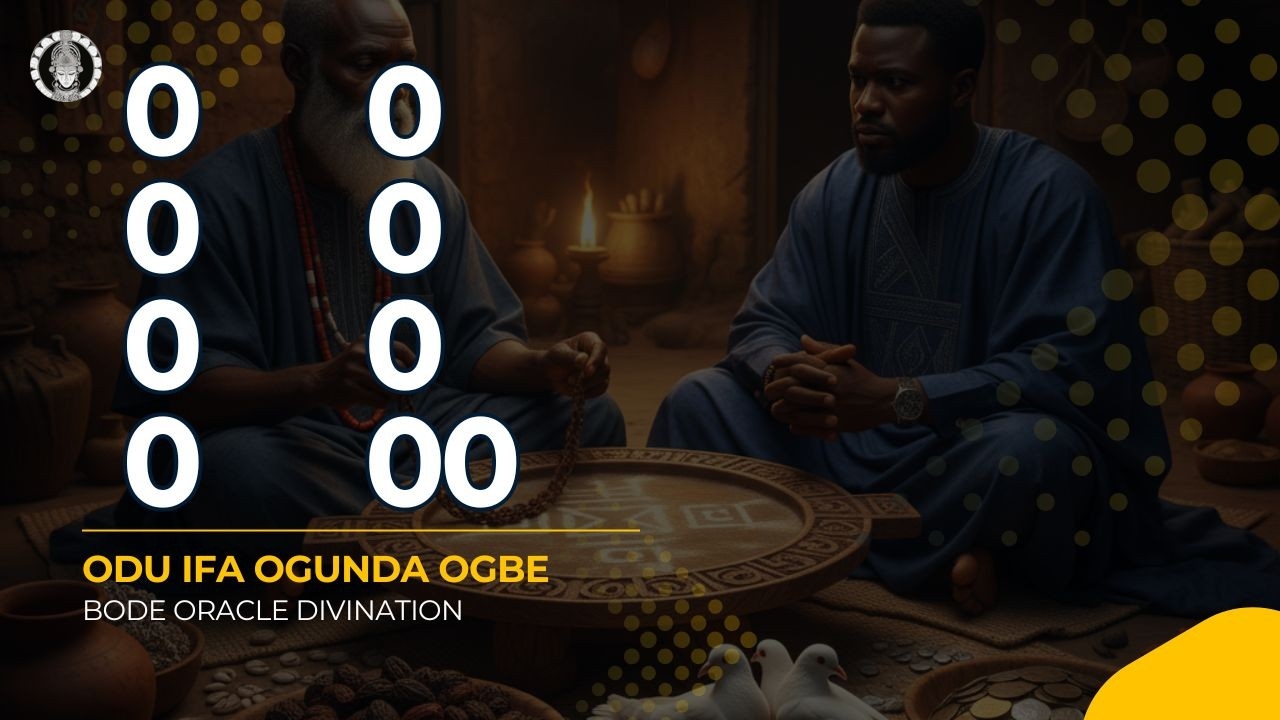
Additional Resources
Internal Links
- Complete Guide to Ogunda Ogbe - Detailed information, taboos, and practices
- What is Odu Ifa Ogundabede? - Comprehensive Blog Post
- Bode.ng Blog - Extensive collection of Ifa and Yoruba spirituality articles
- Complete Odu Ifa Directory
- All About the 16 Odu Ifa and Their Meaning
External Resources
- Ifa of the Yoruba People of Nigeria - UNESCO Archives
- UNESCO Recognition of Ifa Divination System
- Opon Ifa: The Sacred Divination Tray - Wikipedia
- African Traditional Religions: Ifa Divination - Duquesne University
Connect With Us on Social Media
- BODE Oracle on TikTok
- BODE Oracle on YouTube
- BODE Oracle on Facebook
- BODE Oracle on X (Twitter)
- BODE Oracle on Pinterest
Visit Bode.ng to explore more divination teachings, participate in quizzes and polls, and connect with our community of practitioners and learners. Register today to access exclusive content and personalized guidance on your spiritual journey.
Frequently Asked Questions And Answers About Odu Ifa Ogunda Ogbe (Ogundabede)
Find answers to common questions about this sacred Odu Ifa and its divination teachings
Ogunda Ogbe, also known as Ogundabede or Ogundaborogbe, is one of the 256 sacred Odu (divination signs) in the Ifa corpus. It carries powerful messages about attracting wealth and honor, protecting possessions from theft, inviting comprehensive blessings into the home, and achieving victory over multiple enemies. This Odu teaches that proper sacrifices combined with spiritual discipline can transform scarcity into abundance and vulnerability into protection.
In the divination of Tela Roko Tiya, Ifa prescribes a permanent prohibition against consuming kola nut (orogbo) even though kola nut must be offered as part of the sacrifice. This demonstrates an important spiritual principle: consuming kola nut would spiritually counteract the blessings of wealth and honor that the person has received through the sacrifice.
The irony teaches that sometimes we must give away or abstain from things we offer to others in order to receive greater blessings. While kola nut serves as a powerful spiritual offering, personal consumption would break the spiritual alignment that attracts and maintains prosperity for those under this Odu.
The divination for Aduke reveals that theft and loss occur through spiritual openings or vulnerabilities (awon iho) in one's home or life. These gaps allow thieves and malevolent forces to enter and steal. Ifa prescribes sealing all physical and spiritual holes using alupaida and agbesi leaves combined with offerings of pigeons, rooster, and money.
The metaphor of the broken mortar that cannot hold pounded yam illustrates this principle: blessings leak out through spiritual cracks. The solution is not just bringing in more blessings but repairing the container itself through ritual sealing and spiritual fortification, creating an impenetrable barrier against both physical and spiritual theft.
In the divination for Ori, bean cakes fried in palm oil (akara elepo) hold special spiritual significance for attracting all forms of blessings. Akara is round like the sun, golden like wealth, and made from beans which multiply when planted. The roundness represents perfection, completion, and the absence of vulnerabilities.
The verse repeatedly emphasizes that blessings "cannot fail to enter" when akara is properly offered, comparing the roundness of children, bean cakes, and blessings. This creates a spiritual magnet for comprehensive prosperity including wealth (aje), children (omo), spouse (aya), and all forms of wellbeing to enter and remain in one's home.
The divination for Ogunda addresses situations where enemies are numerous and potentially overwhelming. Even Ogunda—the warrior Odu symbolizing strength—must perform ebo to achieve victory. The key insight is that victory comes not from fighting alone but from having "ori rere" (good destiny/spiritual alignment).
Through offerings of two gourds, pigeons, rooster, and money, the spiritual forces arrange circumstances in one's favor. The gourds serve as vessels containing and directing the power of victory. The divination teaches that even when facing established authorities or insurmountable odds, victory is achievable when one's ori is properly aligned through sacrifice.
Ifa warns that people will inquire about the source of one's wealth when this Odu manifests, but the person must remain silent rather than revealing the spiritual foundations of their prosperity. This principle recognizes that not everyone has the spiritual maturity to understand or appreciate the role of Ifa in material success.
Explaining such matters to skeptics or the spiritually unprepared can actually diminish the blessings. The path to maintaining blessings sometimes lies in strategic silence—a form of spiritual protection that preserves the power of the work done. This teaches discretion as a form of spiritual wisdom.
The verse references two birds—one with a black crown and one with a white crown—representing the balance between hidden and visible aspects of prosperity. The black crown symbolizes mysteries that should remain concealed (the spiritual source of wealth), while the white crown represents what is openly visible (the manifestation of that wealth).
The "great bird that flies majestically" is the person who has mastered this balance, moving through life with both spiritual power and material success. This duality teaches that true prosperity requires managing both the seen and unseen aspects of blessing.
The phrase "teyin wa borogbo mole" (pressing down or overcoming Ogbe) is significant because Ogbe is the first and most senior Odu, representing authority, primacy, and established power. The metaphor suggests that even when facing established authorities, entrenched opposition, or seemingly insurmountable odds, victory is achievable.
This doesn't mean disrespecting seniority but rather demonstrates that through proper spiritual work and good ori (destiny alignment), one can overcome any obstacle, even those that appear most formidable or unchangeable. It's about spiritual elevation rather than conflict.
Alupaida and agbesi leaves are used in Ogunda Ogbe to seal spiritual vulnerabilities and create protective barriers. These plants carry inherent protective properties in Yoruba herbalism. When combined with prescribed offerings and used to seal gaps and holes in one's dwelling, they create both physical and spiritual closure.
The ritual works by transforming vulnerable entry points into fortified barriers. Just as physical holes in walls allow intruders to enter, spiritual gaps allow negative forces to steal blessings. The herb-empowered sealing creates an invisible but impenetrable shield that prevents theft and loss on all levels.
The repeated emphasis on "dindindin" (roundness, completeness) represents perfection, completion, and the cycle of life in Yoruba cosmology. A round object has no weak points—it is equally strong in all directions. Similarly, when blessings are "round" or complete, they come in their fullness without lack or deficiency.
The comparison between children, bean cakes, and blessings suggests all three share this quality of completeness. Children are the ultimate blessing, round like akara, both symbolizing the fullness of life and prosperity. This geometric symbolism creates spiritual momentum, affirming that complete blessings will manifest.
All rituals prescribed in Ogunda Ogbe should be performed under the guidance of a qualified Babalawo (Ifa priest) who understands proper procedures and can adapt traditional practices to modern contexts. The priest ensures appropriate materials are used, performs necessary invocations, and maintains the spiritual integrity of the rituals.
While core spiritual principles remain unchanged, modern practice may involve appropriate substitutions where traditional materials are unavailable. The key is maintaining the spiritual essence and symbolic significance of the offerings while adapting to contemporary circumstances. Regular consultation ensures rituals are performed correctly and effectively.
You can explore comprehensive information about Ogunda Ogbe through several resources:
- Complete Guide to Ogunda Ogbe - Detailed taboos and practices
- What is Odu Ifa Ogundabede?
- Bode.ng Blog - Extensive articles on Ifa spirituality
- Complete Odu Ifa Directory
- Bode.ng - Access divination services and community resources
Connect with us on social media for regular teachings: TikTok, YouTube, Facebook, X (Twitter), and Pinterest @BODEOracle. For authentic practice, seek guidance from qualified Ifa priests.
